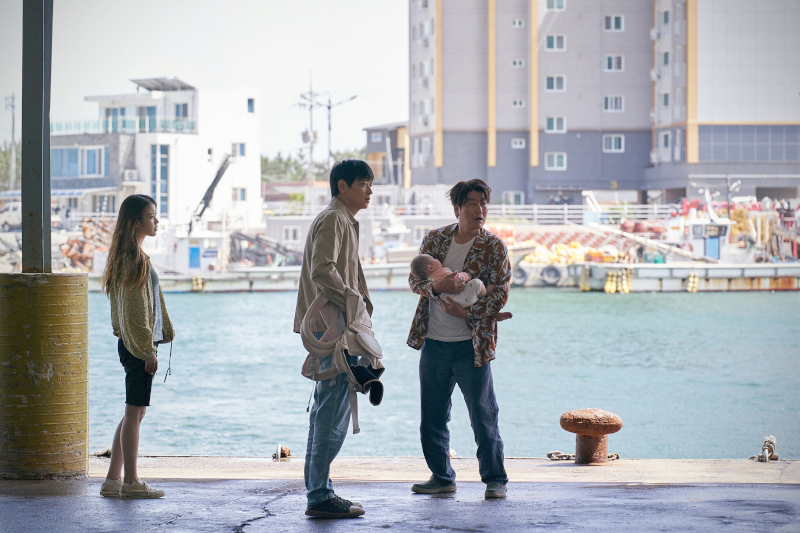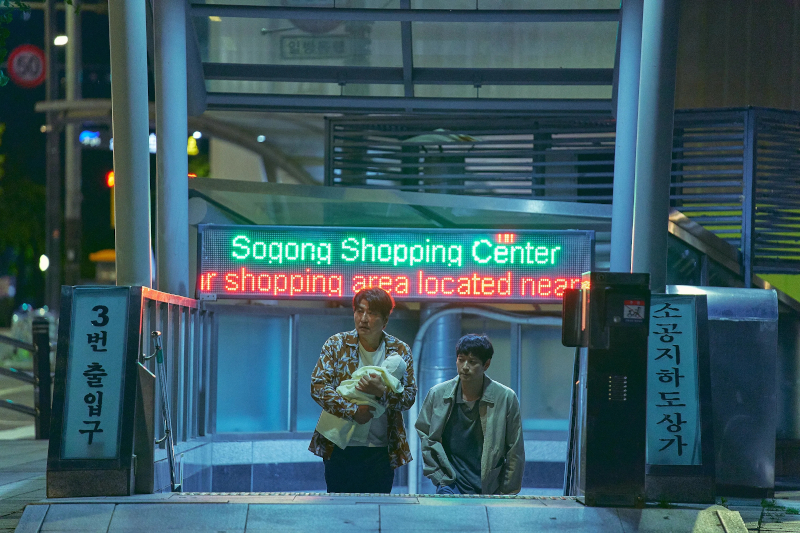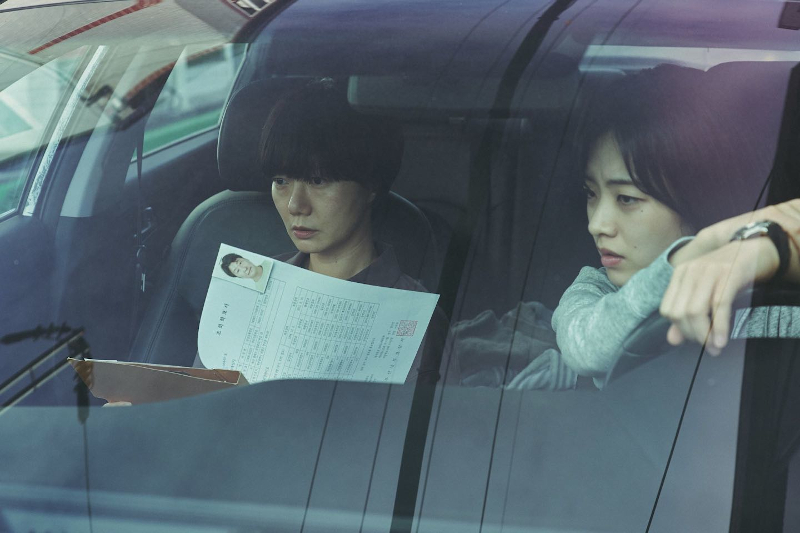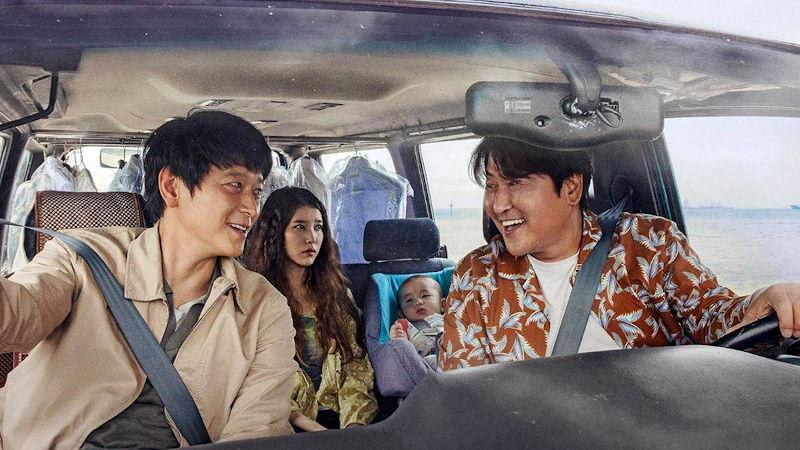Director – Hirokazu Kore-eda – 2022 – South Korea – Cert. 12 – 129m
***
Kore-eda’s second feature outside his native Japan is a curious tale of two traffickers of abandoned babies to childless couples whose business is disrupted by their latest charge’s mother– out in UK cinemas on Friday, February 24th
It’s an intriguing pitch. Kore-eda. the great humanist Japanese director of such extraordinary films as (among others) films After Life (1998), I Wish (2011), Like Father, Like Son (2013), The Third Murder (2017) and the Best Foreign Film Oscar nominee Shoplifters (2018), directs a movie in South Korea. And yet, Broker, like his previous The Truth (2019), similarly made in a country other than his native Japan – in this instance France – is strangely unmoving compared to his home-shot, Japanese work. Although he hasn’t lost his touch as can be seen from some of his work for Japanese TV (A Day-Off Of Kusumi Arimura, 2020).
Whatever the problems are with his working abroad, the the calibre of the cast the director attracts is not one of them. The Truth had Catherine Deneuve, Juliette Binoche and Ethan Hawke, two of the finest living French actresses and arguably one of the best American actors; for Broker, the cast includes top South Korean talent Song Kang Ho and Doona Bae. The latter gave an excellent performance in the director’s earlier Air Doll (2009) in which she plays a blow-up rubber woman who comes to life and starts pondering existential questions. One could suggest that the problem is the thriller element, yet, The Third Murder is a superb part-murder-mystery, part-courtroom-drama.

Like Shoplifters, Broker concerns a makeshift family. In that film, the family are initially presented as normal until the revelation that half of them aren’t actually related; in this one, a number of character are thrown together into a makeshift, non-nuclear family unit, so it’s not hard to see why the story would appeal to a director whose filmography consistently questions and challenges the notion of nuclear and extended families in works such as I Wish, Like Father, Like Son and many more and at the same time expresses a love for that same institution in a film like Still Walking (2008).
One night, staggering up an urban hill in torrential rain, Moon So-young (Lee Ji-eun) abandons her baby Woo-sung (Park Ji-yong), leaving him on the dry, sheltered ground outside the ‘baby box’ hole-in-the-wall receptacle of the Busan Family Church, leaving a note stating the child’s name and promising she will return. She is observed by two concerned women in a car, Su-jin (Doona Bae) and Lee (Lee Joo-young) who clearly have an interest in her actions, with the moralistic and conservative Su-jin stating, she shouldn’t have a child if she’s going to abandon it. She sends Lee to unsuccessfully catch the departing mother while she herself picks up the baby and places it within the safety of the receptacle, closing the door.

Church’s child shelter worker Dong-soo (Gang Dong-won) takes the newly-received child to his partner Ha Sang-hyun (Song Kong Ho) who runs a clothes cleaning shop and, more significantly, an illicit business as a broker of unwanted children to loving families (for a fee) giving the children a better chance in life. For this child, there are customers ready and waiting in nearby cities. However, Moon turns up, concerned that her baby should be placed with parents of whom she approves and generally getting in the way of Ha’s negotiations…
SPOILER ALERT – SPOILERS IN THIS NEXT PARAGRAPH. However, the police are onto the gang in the form of the two women, who are actually plain clothes cops, Su-jin a sergeant and Lee a detective (before it’s entirely clear that they are cops, their dialogue is peppered with remarks about, for instance, they’d like to be able to have a wash). Yet they may find their investigation cut short by homicide cops because Moon is suspected of murder.
The film is built upon an odd narrative structure, a sort of cross between a road movie and a drama thriller, which seems to want to play out as another Kore-eda meditation on the nature of family, a theme the director has frequently explored far more effectively elsewhere. The two men and their for sale baby (and his mother) travel in Ha’s van the back of which contains clothes hanging from coat hangers and the back door of which has a tendency to spring open and can be pulled shut by the driver using a length of string, which gives rise to one scene where the group are stopped by what turns out to be merely a concerned traffic cop.

The two women in pursuit in their car might have wandered in from another movie. They are potentially so interesting in their own right than one can imagine Kore-eda making a film more focused on similar characters to this pair at some point in the future. In this current context, however, they feel like an unnecessary adjunct to an unsatisfactory whole. There’s a brief stopover at an orphanage where the two men are known and it is revealed that Dong-soo, who stops to play football with some of the kids, was himself an abandoned baby. This incident has potential, but it’s never really developed and the film moves swiftly on, although to its credit it throws in an additional child character in the form of small boy Hae-jin (Im Seung-soo) who stows away in Ha’s van for the remainder of the film, turning the little group of two men, one women and two children into a potential, non-nuclear family.
The core of the film is the relationship between the two men on the one hand and the mother (who turns out to also be a prostitute) on the other, with a small boy and a baby thrown in for good measure, but again, this feels like material with great potential that somehow fails to take off. There are hints that, were circumstances different and these characters not involved in illicit activity, things could be different and they could stand a chance of survival as a family unit, but you never feel for this disparate group in the way that you do for the one in Shoplifters. The film is of interest to Kore-eda completists, among whom I number myself, but it’s neither one of his better offerings nor, given its Korean production credentials, an especially striking slice of Korean cinema. Which is a great pity, as it could so easily have been both.
The subject of unwanted children and adoption was tackled far more effectively in the Japan-based True Mothers (Naomi Kawase, 2020).
Broker is out in cinemas in the UK on Friday, February 24th.
Trailer:
